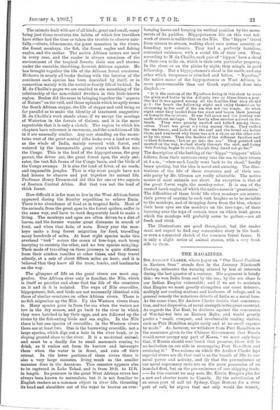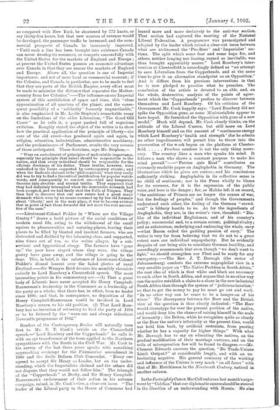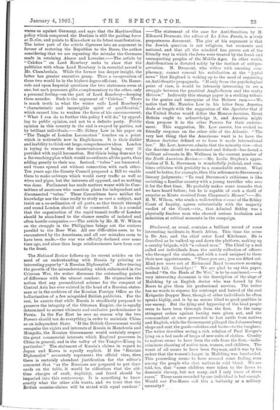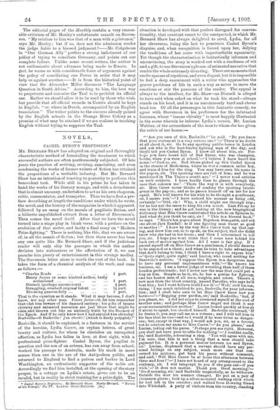THE MAGAZINES.
SIR ANDREW CLARKE, whose paper on " Our Naval Position in Eastern Seas " stands first in the January Nin'eteenth Century, reiterates the warning uttered by him at intervals during the last quarter of a century. His argument is briefly this : we won India from and by the sea ; by the sea alone is our Indian Empire vulnerable ; and if we are to maintain that Empire we must greatly strengthen our coast defences, multiply our coaling stations and harbours of refuge, and in general remedy the notorious defects of India as a naval base. At the same time, Sir Andrew Clarke insists that concentra- tion, and not dispersion, of naval strength is the great essential. As regards the Far East, he declares against the conversion of Wei-hai-wei into an Eastern Malta, and would greatly prefer a " small, compact, and invulnerable coaling station, such as Port Hamilton might easily and at no small expense be made." As, however, we withdrew from Port Hamilton on the assurance given to the Chinese Government that Russia would never occupy any part of Korea, " we must only hope that, if Russia should ever break that promise, there will be no hesitation on our side in reoccupying Port Hamilton and retaining it." Two axioms on which Sir Andrew Clarke lays especial stress are (1) that coal is as the breath of life to our naval power and activity, and (2) that the pre-eminence of our naval supremacy rests not on the mere possession of an ironclad fleet, but on the pre-eminence of our shipping trade. —In this context we may note Mr. Edwin Burgis's plea for a new and shorter route to Canada. By the substitution of an ocean port of call (at Sydney, Cape Breton) for a river port of call; he argues that not only would the transit,
as compared with New York, be shortened by 773 knots, or say thirty-five hours, but that new sources of revenue would
be developed, the passenger traffic be increased, and the com- mercial prospects of Canada be immensely improved.
" Until such a line has been brought into existence Canada can never develop its resources, or compete successfully with the United States for the markets of England and Europe ; at present the United States possess an economic advantage over Canada in that they are nearer the markets of England and Europe. Above all, the question is one of Imperial importance, and not of mere local or commercial moment; if the Colonies, and Canada in particular, are to be made to feel that they are parts of the British Empire, every effort must be made to minimise the distance that separates the Mother- country from her Colonies."—The influence on our Imperial system of this annihilation of space and time, this "close approximation of all quarters of the planet, and the conse- quent possibility of a `solidarity' formerly impracticable," is also emphasised in Mr. Leslie Stephen's remarkable essay on the limitations of the older Liberalism, "The Good Old Cause" as he calls it, a paper packed full of sagacious criticism. Roughly stated, the object of the writer is to show how the practical application of the principle of liberty—the core of the old creed—has produced again and again, in religion, education, industrialism, administrative machinery,
and the predominance of Parliament, results the very reverse of those anticipated. These doctrines, says Mr. Stephen,— "Were an embodiment of principles of and eniable importance, especially the principle that rulers should be responsible to the nation, and that every individual should be responsible for the efficient discharge of his duties. These truths, however, were embodied in the forms suggested by contemporary events; and when the Radicals claimed to be 'philosophical,' what they really did was to try to find a theoretical justification for popular watch- words, and consequently to convert one-sided and temporary theories into absolute and eternal truths. They supposed that they had definitely triumphed when the democratic demands had been accepted, and we had fairly shot the Falls of Niagara. They then had to discover that our new rulers had a great many demands which were by no means summed up by the old formuhe about liberty,' and in the next place, it was to become evident that in point of fact those formulas did not meet the real necessi- ties of the case."
—Lieutenant-Colonel Pedder in " Where are the Village Gentry ?" draws a lurid picture of the social conditions of modern rural life, owing to the withdrawal of the small squires to pleasure-cities and watering-places, leaving their places to be filled by bloated and insolent farmers, who are distrusted and disliked by the labouring class, and supported,
nine times out of ten, so the writer alleges, by a sub- servient and hypocritical clergy. The farmers have " gone up," the poor have stayed where they were, the village gentry have gone away, and the village is going to the dogs. This, in brief, is the substance of Lieutenant-Colonel Pedder's dismal lament over the faded glories of rural England.—Sir Wemyss Reid devotes his monthly chronicle entirely to Lord Rosebery's Chesterfield speech. The most interesting points in his commentary are :—(1) That a great body of Liberals have never accepted Sir Henry Campbell- Bannerman's leadership in the Commons as a leadership of the party as a whole; that there has, in effect, been no leader
since 1896; and that, in consequence, no deposition of Sir Henry Campbell-Bannerman would be involved in Lord Rosebery's return to his old position. (2) That Lord Rose- bery has no intention of returning to lead the party of 1894 or to be fettered by the " worn-out and always ridiculous Newcastle programme of 1892."
Readers of the Contemporary Review will naturally turn first to Mr. E. T. Cook's article on the Chesterfield speech,—" Lord Rosebery and the Copperheads " he calls it. with an apt transference of the term applied to the Northern sympathisers with the South in the Civil War. Mr. Cook in his survey of the last three years speaks with something approaching contempt for the Fitzmaurice amendment in 1900 and the futile Reform Club Concordat. "Every one
agreed to accept Sir Henry as Leader, but on the under- standing, which the Imperialists claimed and the others did
not dispute, that they would not follow him." The triumph of the "Copperheads" at Derby, and Sir Henry Campbell- Bannerman'e endorsement of their action in his autumn campaign, raised, in Mr. Cook's view, a clear-cut issue. " The
leader of the Liberal party in the House of Commons had leaned more and more decisively to the anti-war section. That section had captured the meeting of the National Liberal Federation. A programme was promulgated and adopted by the leader which raised a clear-cut issue between what are nicknamed the 'Pro-Boer ' and Imperialist' sec- tions. The split which some fear and some hope for, and others, neither longing nor fearing, regard as inevitable, was thus brought appreciably nearer." Lord Rosebery's inter- vention at Chesterfield is accordingly defined as "an attempt to save Liberalism from the Copperheads, and at the same time to give it an alternative standpoint as an Opposition." And it differs from his previous interventions in that he is now pledged to practise what he preaches. The conclusion of the article is devoted to an able, and, on the whole, destructive, analysis of the points of agree- ment which the "Copperheads" profess to discover between themselves and Lord Rosebery. Of his criticism of the Government Mr. Cook happily says: "Lord Rosebery did not spike the Opposition guns, as some Ministerialists appear to have hoped. He furnished the Opposition with guns of a new model." Much will depend, Mr. Cook clearly thinks, on the attitude of the Liberal Centre, but still more on Lord Rosebery himself and on the amount of "continuous energy which Lord Rosebery's health and strength' (for he admits no other impediments) will permit him to throw into the prosecution of the work begun on the platform at Chester- field Fearless candour is not the only thing neces- sary. The country likes a man who speaks his mind. It follows a man who shows a constant purpose to make his mind prevail."—" Patriae quis Exul" contributes an extremely readable paper on Anglophobia in Germany. The illustrations which he gives are curious, and his conclusions sufficiently striking. Anglophobia in its collective sense is no child of sentiment ; nor is the Press wholly to blame for its excesses, for it is the expression of the publid voice, and here is the danger ; for, as Moltke left it on record, the ambitions of Princes are no longer the causes of war, but the feelings of peoples," and though the Governments understand each other, the feeling of the German "crowd- soul" is bitterly hostile to us. As for the ingredients of Anglophobia, they are, in the writer's view, threefold: "Dis- like of the individual Englishman, and of his country's policy; commercial and, to a certain extent, political rivalry; and as substratum, underlying and embracing the whole, envy —what Bacon called the gadding passion of envy?' The writer is very far from believing that we do not to a great extent earn our individual unpopularity. But he evidently despairs of our being able to conciliate German hostility, and accordingly recommends that even though " we don't want to fight," we should strengthen our Fleet and be ready for any emergency.—The Rev. J. T. Darragh (the rector of Johannesburg) combats the extreme negrophilist view in a very sensible paper on " The Native Problem in South Africa," the root idea of which is that white and black are necessary to each other in South Africa, and argues that in no other way can the native establish a claim to a share in the new industrial South Africa than through the system of " judicious taxation," so that to get the money to pay be must go out and work. "In no other way can Ile cease to be a hanger-on of his wives," The discrepancy between the Boer and the British view of the question is thus clearly indicated : "The Boer would stereotype for ever the present position of the native, and would deny him the chance of raising himself in the scale of humanity ; the Briton, while he recognises quite as clearly as the Boer the native's inferiority at the present time, would not hold him back, by artificial restraints, from proving whether he has a capacity for higher things." With what Mr. Darragh has to say on educating the natives, on the gradual modification of their marriage customs, and on the evils of miscegenation few will be found to disagree.—Mr. Clement Edwards answers the question, "Do Trade-Unions Limit Output ? " at considerable length, and with an un hesitating negative. His general summary of the working and influence of the Unions is very much " on all fours " with that of Mr. Hutchinson in the Nineteenth Century, noticed in another column.
In the Fortnightly Canon MacColl enforces last month's argu- ment by " Calchas," that our diplomatic course shonldbe steered in'the direction of an understanding with Russia:- He also
warns us against Germany, and says that the Machiavellian policy which conquered the Duchies is still the guiding force atBtrlin, and points to Kiao-chow as its latest manifestation. The- latter part of the article digresses into an argument in favour of restoring the Republics to the Boers, the author considering that we are repeating the mistake the Germans made in retaining Alsace and Lorraine.—The article by " Calchas " on Lord Rosebery seeks to show that the politician with whom Lord Rosebery is in essential accord is Mr. Chamberlain. While the former has deeper insight, the latter has greater executive grasp. Thus a co-operation of these two would be in the highest degree efficient. On Home- rule and upon Imperial questions the two statesmen seem at one, but each possesses gifts complementary to the other, only a personal feeling—on the part of Lord Rosebery—keeping them asunder. Such is the argument of " Calchas." There is much truth in what the writer calls Lord Rosebery's "characteristic and incorrigible spirit of qualification," which caused him to weaken the force of his announcement, " What I can do to further this policy I will do," by appeal. ing to public opinion, and not to a definite party. Public opinion in. this country in the end is swayed by parties, not by brilliant individuals.—Mi. Sidney Low in his paper on "The Tangle of London Locomotion" touches on a point which is noticeable now in Englishmen. It is their dislike and inability to think out large, comprehensive ideas. London is trying to remove the inconvenience of being very ill provided with rapid locomotion. But this is being done not by a far-reaching plan which would co-ordinate all the parts, thus adding greatly to their use. Instead, " tubes " are burrowed, and trams spread out without connection with each other. Ten years ago the County Council prepared a Bill to enable them to make subways which would carry traffic as well as wires and pipes, but the interests all opposed, and so nothing was done. Parliament has made matters worse with its Com- mittees of amateurs who sanction plans for independent and disconnected "tubes." These Committees have neither the knowledge nor the time really to study so vast a subject, and insist on a co-ordination of all parts, so that transit through and round London should all be connected. It is a scandal that the organisation of the rapid transit traffic of London should be abandoned to the chance results of isolated and often hostile companies.—The article by Mr. H. W. Wilson on the struggle in the Philippines brings out the curious parallel to the Boer War. All our difficulties seem to be encountered by the Americans,. and all our mistakes seem to have been made,—the war was officially declared over some time ago, and since then large reinforcements have been sent to the front.
The National Revicw follows up its recent articles on the need of an understanding with Russia by printing an interesting paper by" A Russian Diplomatist." After tracing the growth of the misunderstanding which culminated in the Crimean War, the writer discusses the outstanding points of difference with the utmost candour. He stigmatises the notion that any premeditated scheme for the conquest of Central Asia has ever existed in the head of a Russian states- man or in the archives of the Russian Foreign Office as the hallucination of a few misguided British publicists. " For the rest, he asserts that while Russia is steadfastly purposed to preserve the integrity of the Ottoman Empire, she is equally determined to secure ultimate and exclusive predominance in Persia. In the Far East he sees no reason why the two Powers should not do everything in order to maintain China as an independent State. "If the British Government would recognise the rights and interests of Russia in Manchuria and Mongolia, the Russian Government would certainly respect the great commercial interests which England possesses in China in general, and in the valley of the Yangtse-Kiang in particular." The statement of Russia's claims in regard to Japan and Korea is equally explicit. If the "Russian Diplomatist" accurately represents the official view, then there is certainly abundant justification for the editor's comment that " as the Russians are prepared to put their cards on the table, it would be ridiculous that the old- time charges of craft, duplicity, and fraud should be imported into this controversy. It is something to know exactly what the other side wants, and we trust that the British counter-claims will be stated with equal candour." —The statement of the case for Anti-Semitism by M. Edouard Drumont, the editor of La Libre Parole, is a truly preposterous document. The gist of his argument is that the Jewish question is not religious, but economic and national, and that all the mischief has grown out of the friendly way in which the Jews were treated by the frank and unsuspecting peoples of the Middle Ages. In other words, Anti-Semitism is dictated solely by the instinct of self-pre- servation. M. Drumont, who writes with amazing com- placency, cannot conceal his satisfaction at the " joyful news" that England is waking up to the need of organising an Anti-Semitic propaganda. " If only from the psychological point of view, it would be intensely interesting to see a struggle between the practical Anglo-Saxon and the crafty Hebrew." Indirectly this strange paper is a striking tribute to the genius and enterprise of the Hebrew race.—We notice that Mr. Maurice Low in his letter from America deals at length with the suggestion of the Spectator that if the United States would define the Monroe doctrine, Great Britain ought to acknowledge it, and America might then propose it to the other Powers for their endorse- ment. This suggestion, Mr. Low asserts, has evoked no friendly response on the other side of the Atlantic. " The very last thing that the Americana want is to have the Monroe doctrine defined or to have it made international law." Mr. Low, however, admits that the minority view—that the doctrine should be modernised and defined—has found a brilliant advocate in Mr. Wellman in the current number of the North American Review.—Mr. Leslie Stephen's appre- ciation of R. L. Stevenson is wonderfully judicial, and corn_ bines criticism with geniality to a remarkable extent. What could be better, for example, than this reference to Stevenson's literary judgments : " To read Stevenson's criticisms is like revisiting a familiar country with a young traveller who sees it for the first time. He probably makes some remarks that we have heard before; but be is capable of such a thrill of surprise as Keats received from Chapman's Homer."—Mr. H. W. Wilson, who sends a well-written resume of the Schley Court of Inquiry, agrees substantially with the majority verdict of the Court,—viz., that Admiral Schley was a physically fearless man who showed serious hesitation and indecision at critical moments in the campaign.
Blackwood, as usual, contains a brilliant record of some interesting incidents in South Africa. This time the scene is De Aar, and the chief actor Lord Kitchener. He is described as he walked up and down the platform, making up a cavalry brigade, with "a colonel man." The Chief by a nod called out individuals from the untidy collection of officers who thronged the station, and with a word assigned to them their new appointments. "There you are; you are fitted out. Mind you move out of Richmond Road to-morrow morning without fail. Good-bye ! " We are glad to say this paper, headed " On the Heels of De Wet," is to be continued.—A very interesting document is the description of the siege of Mafeking by an English doctor who was forced by the Boers to give them his professional services. The writer has no words to express his contempt and hatred of the real Kriigerite Dopper Boer, though of other individuals he often speaks highly, and is by no means blind to good qualities in our enemy. But the lying and hypocrisy of the head people seem to have been thorough from the first. In the camp stringent orders against looting were given out, and the commandant at once proceeded to loot cattle from natives and English, while the Government pillaged the Johannesburg shops and sent the goods—clothes and boots—to the burghers. The writer describes seeing a rich relation of Paul Kriiger's lying on a bed made of heaps of new suits of clothes. Cruelty to natives seems to have been the rule from the first,—indis- criminate shooting of native men, women, and children. The worst of all seems to have been Snyman, and it was by his orders that the women's laager in Mafeking was bombarded. This proceeding seems to have aroused some feeling, even among the people who shot natives in cold blood. We are told, too, that "some children were taken to the farms to domestic slavery, but not many, and I only know of three cases." Three cases recorded by one individual is bad enough. Would our Pro-Boers call this a barbarity or a military necessity ? The editorial pages of the Monthly contain a very reason- able criticism of Mr. Henley's unfortunate assault on Steven- son. " My relation to him was that of a man with a grievance," says Mr. Henley; bat if so, does not the admission render the judge liable to a biassed judgment P—Mr. Colquhoun in " Our German Ally " prefers a strong indictment of our policy of trying to conciliate Germany, and points out our complete failure. Unlike some recent writers, the author is not enthusiastic about advances being made to Russia. In fact, he warns us with considerable force of argument against the policy of conciliating one Power in order that it may help us against another.—It is from the historical point of view that Sir Alexander Miller discusses " The Language Question in South Africa." According to him, the best way to perpetuate and canonise the Taal is to prohibit its official use. Rather we should allow it to be used by those who wish, but provide that all official records in Courts should be kept in English, " or, where in Dutch, accompanied by an English translation." The writer points to the success already gained by the English schools in the Orange River Colony as a promise of what may be attained if we are zealous in teaching English without trying to suppress the Taal.









































 Previous page
Previous page